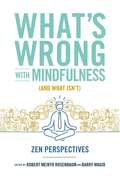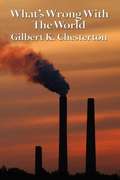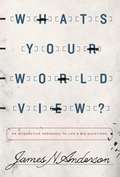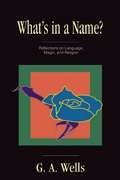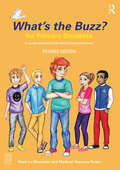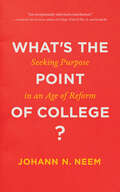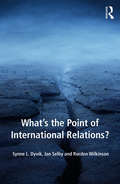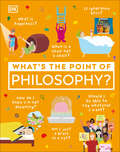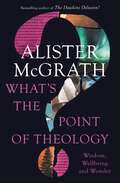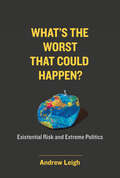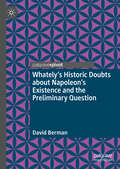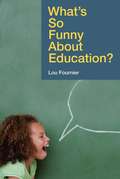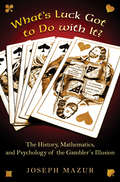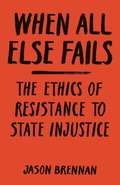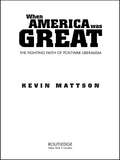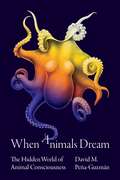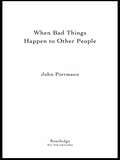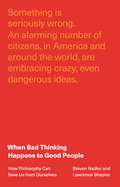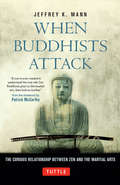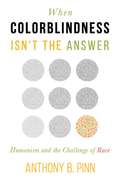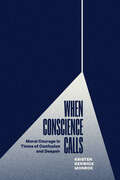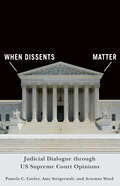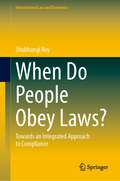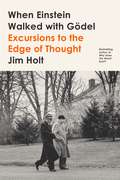- Table View
- List View
What's Wrong with Mindfulness (And What Isn't): Zen Perspectives
by Robert Rosenbaum Barry MagidMindfulness seems to be everywhere--but are we sure that's a good thing? Teachers Sallie Jiko Tisdale, Gil Fronsdal, Norman Fischer, and more explain how removing mindfulness from Buddhism may set a dangerous precedent. Mindfulness is in fashion. Oprah loves it, Google teaches it to employees--it has become widespread as a cure-all for stress, health problems and psychological difficulties, interpersonal trouble, and existential anxiety. However, when its proponents try to make it more accessible by severing it from its Buddhist roots, they run the risk of leeching mindfulness of its transformative power. Taught outside of its ethical and spiritual context it becomes a mere means to an end, rather than a way of life. Mindfulness is in danger of being co-opted into the spiritual equivalent of fast food: "McMindfulness." Instead of being better people, we just become better employees, better consumers. The Zen teachers gathered here ask a bold question: Is universal mindfulness really a good thing? Ranging from thoughtful critiques to personal accounts of integrating mindfulness into daily life, each chapter offers insights to ground mindfulness in a deeper understanding of both where it comes from, and where it might be headed. With contributions from Marc Poirer, Robert Meikyo Rosenbaum, Barry Magid, Hozan Alan Senauke, Sallie Jiko Tisdale, Gil Fronsdal, Max Erdstein, Zoketsu Norman Fischer, Janet Jiryu Abels, Grace Schireson, Sojun Mel Weitsman, and Robert Sharf.
What's Wrong with the World
by G. K. ChestertonIn What's Wrong With The World Chesterton rightly points out that what people see as "wrong with the world" are only the symptoms of a deeper problem. He shows that our governments, be they capitalistic or socialistic, also fail to see the deeper problem. With a keen wit and lively prose he cuts directly to the true problems that society must deal with and his solutions feel utterly correct.
What's Your Worldview? An Interactive Approach to Life's Big Questions
by James N. AndersonHow do you view the world? It’s a big question. And how you answer is one of the most important things about you. Not sure what you’d say? Join James Anderson on an interactive journey of discovery aimed at helping you understand and evaluate the options when it comes to identifying your worldview. Cast in the mold of a classic “Choose Your Own Adventure” story, What’s Your Worldview? will guide you toward finding intellectually satisfying answers to life’s biggest questions—equipping you to think carefully about not only what you believe but why you believe it and how it impacts the rest of your life.
What's in a Name?
by George Albert Wells"Using his probing intelligence to criticize the views of pundits from Locke to Chomsky, from Ayer to religious apologists, G. A. Wells has produced a lively essay on the persistent mistakes that have been made in understanding the relations among things, words, and ideas. The chapter entitled 'Language and the Bible' is a gem. It should delight skeptics even as it challenges believers. What's in a Name? shows, as if it still needed to be shown, that Wells is one of the foremost religious critics of our time."--Michael Martin Professor of Philosophy, Boston University
What's the Buzz? for Primary Students: A Social and Emotional Enrichment Programme
by Mark Le Messurier Madhavi Nawana ParkerWhat’s the Buzz? is an internationally renowned series of programmes designed to help children and young people develop social and emotional awareness. Now available in a revised second edition, What’s the Buzz for Primary Students is a sixteen-lesson programme targeting everyday social challenges faced by primary aged children, such as peer pressure and bullying style behaviours; competition and handling disappointment; feelings and wellbeing and self-awareness. Each lesson is designed around the SAFE criteria (Sequenced; Active; Focused; Explicit) and includes: A new and beautifully illustrated ‘Archie’ story, in which the popular character faces a new and relatable social challenge A series of lively and exciting games and activity suggestions Role-plays and discussion points so that children can put their skills into practice in a supportive environment Having already proven to appeal to teachers and support staff, counsellors and psychologists worldwide, this resource is suitable for anybody looking to enrich the social lives of children. Resources and training modules to support this book can be found on the website www.whatsthebuzz.net.au.
What's the Point of College?: Seeking Purpose in an Age of Reform
by Johann N. NeemBefore we can improve college education, we need to know what it's for.In our current age of reform, there are countless ideas about how to "fix" higher education. But before we can reconceptualize the college experience, we need to remember why we have these institutions in the first place—and what we want from them. In What's the Point of College?, historian Johann N. Neem offers a new way to think about the major questions facing higher education today, from online education to disruptive innovation to how students really learn. As commentators, reformers, and policymakers call for dramatic change and new educational models, this collection of lucid essays asks us to pause and take stock. What is a college education supposed to be? What kinds of institutions and practices will best help us get there? And which virtues must colleges and universities cultivate to sustain their desired ends? During this time of drift, Neem argues, we need to moor our colleges once again to their core purposes. By evaluating reformers' goals in relation to the specific goods that a college should offer to students and society, What's the Point of College? connects public policy to deeper ethical questions. Exploring how we can ensure that America's colleges remain places for intellectual inquiry and reflection, Neem does not just provide answers to the big questions surrounding higher education—he offers readers a guide for how to think about them.
What's the Point of International Relations?
by Rorden Wilkinson Jan Selby Synne L. DyvikWhat’s the Point of International Relations casts a critical eye on what it is that we think we are doing when we study and teach international relations (IR). It brings together many of IR’s leading thinkers to challenge conventional understandings of the discipline’s origins, history, and composition. It sees IR as a discipline that has much to learn from others, which has not yet lived up to its ambitions or potential, and where much work remains to be done. At the same time, it finds much that is worth celebrating in the discipline’s growing pluralism and views IR as a deeply political, critical, and normative pursuit. The volume is divided into five parts: • What is the point of IR? • The origins of a discipline • Policing the boundaries • Engaging the world • Imagining the future Although each chapter alludes to and/or discusses central aspects of all of these components, each part is designed to capture the central thrust of the concerns of the contributors. Moving beyond western debate, orthodox perspectives, and uncritical histories this volume is essential reading for all scholars and advanced level students concerned with the history, development, and future of international relations.
What's the Point of Philosophy? (DK What's the Point of?)
by DKTravel down the road of wisdom to discover how to think about a series of philosophical problems, how to defend your opinions on them, and how to evaluate the opinions of others.Why is philosophy important? What&’s so great about it? Leap into the world of philosophy and discover questions about life, the universe, and human behavior that great thinkers have pondered throughout history, and which are still being asked today.Philosophical ideas affect our day-to-day lives in ways that you might not expect. But understanding these ideas can be daunting – even for adults! If you want to learn how to argue the case for animal rights, why the concept of equality has many sides, or even what the theories are about why humans exist at all, What&’s the Point of Philosophy? is the perfect place to start. Put your thinking cap on and get ready to explore:- A variety of fascinating topics reveal pivotal questions in philosophy that are still discussed today.- Timeline spreads illustrate major schools of thought and the women and men who developed them.- Clear, accessible text makes the book appealing for readers of all ages.- Uncoated paper gives a vintage feel to the book which perfectly complements the illustrator&’s style.This fascinating philosophy book is a unique way to get kids to begin thinking critically about the world around them, and showcases the many ways in which philosophy has changed the world, one crazy idea at a time, and it is guaranteed to inspire, surprise, amuse, and entertain everybody who picks it up. By slowly unraveling arguments to unpack complex theories, What&’s the Point of Philosophy? allows you to connect with ideas in a new and exciting way. If you never stop asking &‘why?&’, this is the book for you!
What's the Point of Theology?: Wisdom, Wellbeing and Wonder
by Alister E. McGrathTheology is the study of the nature of God and of religious belief. But why should that matter to us?What's the point of theology?In this wonderfully accessible book, renowned theologian Alister McGrath answers that question--What's the point of theology?--and explores the depth and breadth theology can bring to our lives. Drawing on insights from his experience of coming to Christianity from atheism, this exhilarating and enlightening volume reveals how theology can help us grow in wisdom, contribute to our wellbeing, spark our innate sense of wonder, and above all, grow in faith and love as we draw ever closer to the divine. Ideal for new and seasoned Christians who want to engage more deeply with their faith, as well as those who are puzzled by spiritual matters and curious to find out more, What's the Point of Theology? will open your eyes to all that theology has to offer--a wiser understanding of what really matters, a richer vision of the good life, a deeper appreciation of the beauty of nature, and an avenue to strengthen your faith and relationship with God.
What's the Worst That Could Happen?: Existential Risk and Extreme Politics
by Andrew LeighWhy catastrophic risks are more dangerous than you think, and how populism is making them worse.Did you know that you&’re more likely to die from a catastrophe than in a car crash? The odds that a typical US resident will die from a catastrophic event—for example, nuclear war, bioterrorism, or out-of-control artificial intelligence—have been estimated at 1 in 6. That&’s fifteen times more likely than a fatal car crash and thirty-one times more likely than being murdered. In What&’s the Worst That Could Happen?, Andrew Leigh looks at catastrophic risks and how to mitigate them, arguing provocatively that the rise of populist politics makes catastrophe more likely. Leigh explains that pervasive short-term thinking leaves us unprepared for long-term risks. Politicians sweat the small stuff—granular policy details of legislation and regulation—but rarely devote much attention to reducing long-term risks. Populist movements thrive on short-termism because they focus on their followers&’ immediate grievances. Leigh argues that we should be long-termers: broaden our thinking and give big threats the attention and resources they need. Leigh outlines the biggest existential risks facing humanity and suggests remedies for them. He discusses pandemics, considering the possibility that the next virus will be more deadly than COVID-19; warns that unchecked climate change could render large swaths of the earth uninhabitable; describes the metamorphosis of the arms race from a fight into a chaotic brawl; and examines the dangers of runaway superintelligence. Moreover, Leigh points out, populism (and its crony, totalitarianism) not only exacerbates other dangers but is also a risk factor in itself, undermining the institutions of democracy as we watch.
Whately's Historic Doubts about Napoleon's Existence and the Preliminary Question
by David BermanThis book examines Richard Whately's classic book Historic Doubts Relative to Napoleon Buonaparte. After considering its textual development, the analysis focusses on Whately's idea of the &‘Preliminary Question&’; the idea that in the debate about Jesus&’s miracles there is a more basic question that has been overlooked and which invalidates the debate. It is asked whether the notion of a Preliminary Question might not illuminate other philosophical disputes. Finally, a variant of the Preliminary Question is proposed in which both positions in a dispute are shown to be true and this form of the question is invoked to shed light on the debate between metaphysical monists and dualists and to revisit the debate about miracles. This book is essential reading for all scholars of the philosophy of religion and British 19th century philosophy. It is also of interest to scholars researching David Hume and Bertrand Russell.
Whats So Funny About Education?
by Lou FournierUsing affectionate humor, Fournier delivers both stark and subtle epiphanies alongside enduring truths, offering a deeper social commentary on the present conditions and future directions of American education.With an engaging satiric approach, the author spares no topic in casting a wide net over education, covering music and the arts, school culture, leadership, assessment, staff development, history, technology, higher education, and many more.
What’s Luck Got to Do with It?
by Joseph MazurWhy do so many gamblers risk it all when they know the odds of winning are against them? Why do they believe dice are "hot" in a winning streak? Why do we expect heads on a coin toss after several flips have turned up tails? What's Luck Got to Do with It? takes a lively and eye-opening look at the mathematics, history, and psychology of gambling to reveal the most widely held misconceptions about luck. It exposes the hazards of feeling lucky, and uses the mathematics of predictable outcomes to show when our chances of winning are actually good. Mathematician Joseph Mazur traces the history of gambling from the earliest known archaeological evidence of dice playing among Neolithic peoples to the first systematic mathematical studies of games of chance during the Renaissance, from government-administered lotteries to the glittering seductions of grand casinos, and on to the global economic crisis brought on by financiers' trillion-dollar bets. Using plenty of engaging anecdotes, Mazur explains the mathematics behind gambling--including the laws of probability, statistics, betting against expectations, and the law of large numbers--and describes the psychological and emotional factors that entice people to put their faith in winning that ever-elusive jackpot despite its mathematical improbability. As entertaining as it is informative, What's Luck Got to Do with It? demonstrates the pervasive nature of our belief in luck and the deceptive psychology of winning and losing.
When All Else Fails: The Ethics of Resistance to State Injustice
by Jason BrennanWhy you have the right to resist unjust governmentThe economist Albert O. Hirschman famously argued that citizens of democracies have only three possible responses to injustice or wrongdoing by their governments: we may leave, complain, or comply. But in When All Else Fails, Jason Brennan argues that there is a fourth option. When governments violate our rights, we may resist. We may even have a moral duty to do so.For centuries, almost everyone has believed that we must allow the government and its representatives to act without interference, no matter how they behave. We may complain, protest, sue, or vote officials out, but we can’t fight back. But Brennan makes the case that we have no duty to allow the state or its agents to commit injustice. We have every right to react with acts of “uncivil disobedience.” We may resist arrest for violation of unjust laws. We may disobey orders, sabotage government property, or reveal classified information. We may deceive ignorant, irrational, or malicious voters. We may even use force in self-defense or to defend others.The result is a provocative challenge to long-held beliefs about how citizens may respond when government officials behave unjustly or abuse their power.
When America Was Great: The Fighting Faith of Liberalism in Post-War America
by Kevin MattsonA sweeping intellectual history that will make us rethink postwar politics and culture, When America Was Great profiles the thinkers and writers who crafted a new American liberal tradition in a conservative era -- from historians Arthur Schlesinger, Jr., and C. Vann Woodward, to economist John Kenneth Galbraith and theologian Reinhold Niebuhr.A compelling tale that will redefine the word "liberal" for a new generation, Mattson retraces the intellectual journey of these towering figures. They served in the Second World War. They opposed communism but also wanted to make America's poor visible to the affluent society. Contrary to those who characterize liberals as naïve or sentimental "bleeding hearts," they had a tough-minded and nuanced vision that stressed both human limitations and hope. They felt America should stand for something more than just a strong economy.
When Animals Dream: The Hidden World of Animal Consciousness
by David M. Peña-GuzmánA spellbinding look at the philosophical and moral implications of animal dreamingAre humans the only dreamers on Earth? What goes on in the minds of animals when they sleep? When Animals Dream brings together behavioral and neuroscientific research on animal sleep with philosophical theories of dreaming. It shows that dreams provide an invaluable window into the cognitive and emotional lives of nonhuman animals, giving us access to a seemingly inaccessible realm of animal experience.David Peña-Guzmán uncovers evidence of animal dreaming throughout the scientific literature, suggesting that many animals run “reality simulations” while asleep, with a dream-ego moving through a dynamic and coherent dreamscape. He builds a convincing case for animals as conscious beings and examines the thorny scientific, philosophical, and ethical questions it raises. Once we accept that animals dream, we incur a host of moral obligations and have no choice but to rethink our views about who animals are and the interior lives they lead.A mesmerizing journey into the otherworldly domain of nonhuman consciousness, When Animals Dream carries profound implications for contemporary debates about animal cognition, animal ethics, and animal rights, challenging us to regard animals as beings who matter, and for whom things matter.
When Bad Things Happen to Other People
by John PortmannAlthough many of us deny it, it is not uncommon to feel pleasure over the suffering of others, particularly when we feel that suffering has been deserved. The German word for this concept-Schadenfreude-has become universal in its expression of this feeling. Drawing on the teachings of history's most prominent philosophers, John Portmann explores the concept of Schadenfreude in this rigorous, comprehensive, and absorbing study.
When Bad Thinking Happens to Good People: How Philosophy Can Save Us from Ourselves
by Steven Nadler Lawrence ShapiroWhy the tools of philosophy offer a powerful antidote to today’s epidemic of irrationalityThere is an epidemic of bad thinking in the world today. An alarming number of people are embracing crazy, even dangerous ideas. They believe that vaccinations cause autism. They reject the scientific consensus on climate change as a “hoax.” And they blame the spread of COVID-19 on the 5G network or a Chinese cabal. Worse, bad thinking drives bad acting—it even inspired a mob to storm the U.S. Capitol. In this book, Steven Nadler and Lawrence Shapiro argue that the best antidote for bad thinking is the wisdom, insights, and practical skills of philosophy. When Bad Thinking Happens to Good People provides an engaging tour through the basic principles of logic, argument, evidence, and probability that can make all of us more reasonable and responsible citizens.When Bad Thinking Happens to Good People shows how we can more readily spot and avoid flawed arguments and unreliable information; determine whether evidence supports or contradicts an idea; distinguish between merely believing something and knowing it; and much more. In doing so, the book reveals how epistemology, which addresses the nature of belief and knowledge, and ethics, the study of moral principles that should govern our behavior, can reduce bad thinking. Moreover, the book shows why philosophy’s millennia-old advice about how to lead a good, rational, and examined life is essential for escaping our current predicament.In a world in which irrationality has exploded to deadly effect, When Bad Thinking Happens to Good People is a timely and essential guide for a return to reason.
When Buddhists Attack
by Patrick Mccarthy Jeffrey K. MannFilm, television and popular fiction have long exploited the image of the serene Buddhist monk who is master of the deadly craft of hand-to-hand combat. While the media overly romanticizes the relationship between a philosophy of non-violence and the art of fighting, When Buddhists Attack shows this link to be nevertheless real, even natural.Exploring the origins of Buddhism and the ethos of the Japanese samurai, university professor and martial arts practitioner Jeffrey Mann traces the close connection between the Buddhist way of compassion and the way of the warrior. This book serves as a basic introduction to the history, philosophy, and current practice of Zen as it relates to the Japanese martial arts. It examines the elements of Zen that have found a place in budo-the martial way-such as zazen, mushin, zanshin and fudoshin, then goes on to discuss the ethics and practice of budo as modern sport. Offering insights into how qualities integral to the true martial artist are interwoven with this ancient religious philosophy, this book will help practitioners reconnect to an authentic spiritual discipline of the martial arts.
When Colorblindness isnt the Answer: Humanism and the Challenge of Race
by Anthony PinnThe future of the United States rests in many ways on how the ongoing challenge of racial injustice in the country is addressed. Yet, humanists remain divided over what if any agenda should guide humanist thought and action toward questions of race. In this volume, Anthony B. Pinn makes a clear case for why humanism should embrace racial justice as part of its commitment to the well-being of life in general and human flourishing in particular. As a first step, humanists should stop asking why so many racial minorities remain committed to religious traditions that have destroyed lives, perverted justice, and justified racial discrimination. Rather, Pinn argues, humanists must first confront a more pertinent and pressing question: why has humanism failed to provide a more compelling alternative to theism for so many minority groups? For only with a bit of humility and perspective—and a recognition of the various ways in which we each contribute to racial injustice—can we truly fight for justice.
When Conscience Calls: Moral Courage in Times of Confusion and Despair
by Kristen Renwick MonroeWhat is moral courage? Why is it important and what drives it? An argument for why we should care about moral courage and how it shapes the world around us. War, totalitarianism, pandemics, and political repression are among the many challenges and crises that force us to consider what humane people can do when the world falls apart. When tolerance disappears, truth becomes rare, and civilized discourse is a distant ideal, why do certain individuals find the courage to speak out when most do not? When Conscience Calls offers powerful portraits of ordinary people performing extraordinary acts—be it confronting presidents and racist mobs or simply caring for and protecting the vulnerable. Uniting these portraits is the idea that moral courage stems not from choice but from one’s identity. Ultimately, Kristen Renwick Monroe argues bravery derives from who we are, our core values, and our capacity to believe we must change the world. When Conscience Calls is a rich examination of why some citizens embrace anger, bitterness, and fearmongering while others seek common ground, fight against dogma, and stand up to hate.
When Conscience Calls: Moral Courage in Times of Confusion and Despair
by Kristen Renwick MonroeWhat is moral courage? Why is it important and what drives it? An argument for why we should care about moral courage and how it shapes the world around us.War, totalitarianism, pandemics, and political repression are among the many challenges and crises that force us to consider what humane people can do when the world falls apart. When tolerance disappears, truth becomes rare, and civilized discourse is a distant ideal, why do certain individuals find the courage to speak out when most do not?When Conscience Calls offers powerful portraits of ordinary people performing extraordinary acts—be it confronting presidents and racist mobs or simply caring for and protecting the vulnerable. Uniting these portraits is the idea that moral courage stems not from choice but from one’s identity. Ultimately, Kristen Renwick Monroe argues bravery derives from who we are, our core values, and our capacity to believe we must change the world. When Conscience Calls is a rich examination of why some citizens embrace anger, bitterness, and fearmongering while others seek common ground, fight against dogma, and stand up to hate.
When Dissents Matter: Judicial Dialogue through US Supreme Court Opinions (Constitutionalism and Democracy)
by Artemus Ward Pamela C. Corley Amy SteigerwaltThe ability of US Supreme Court justices to dissent from the majority, to formally register and explain their belief that a case has been wrongly decided, represents a time-honored tradition of perhaps the most august American institution. Yet the impact of these dissents, which allow justices to engage in a dialogue over law and policy, has seldom, if ever, been the focus of dedicated study. Analyzing the influence of past dissents on later Supreme Court majority opinions, this book presents the first comprehensive study of the effects of dissenting opinions and illuminates which types of dissents successfully influence legal and policy debates, which ones fail to make a difference, and why.Drawing on the private papers of the justices and original data, this book demonstrates that court majorities engage with dissents posing a particular threat to their opinions, and that they can be persuaded by thoughtful and careful dissenting arguments.
When Do People Obey Laws?: Towards an Integrated Approach to Compliance (International Law and Economics)
by Shubhangi RoyThis book examines the intricate dynamics of when individuals adhere to laws, taking into account the context in which laws attempt to shape human behavior. While existing literature touches upon various reasons why people comply with laws, the book focuses on a critical question which has been missing from the discussion: when do people obey laws? By treating law as a form of social communication, it develops an integrated framework to answer this question. It explores how social, psychological, and institutional conditions shape compliance decisions of individuals. What does a law signify? When does the compulsion to obey arise? When do individuals comply out of a fear for legal sanctions or social repercussions? Why do some laws have high symbolic values and others fail despite harsh punishments? The book unveils the contextual intricacies that underlie obedience to law. It challenges conventional wisdom and offers a fresh perspective on the power and limitationsof law in shaping human behavior. For scholars and academics seeking a deeper understanding of legal compliance and role of law in shaping behaviors, this book will be an indispensable resource.
When Einstein Walked with Gödel: Excursions to the Edge of Thought
by Jim HoltFrom Jim Holt, the New York Times bestselling author of Why Does the World Exist?, comes an entertaining and accessible guide to the most profound scientific and mathematical ideas of recent centuries in When Einstein Walked with Gödel: Excursions to the Edge of Thought.Does time exist? What is infinity? Why do mirrors reverse left and right but not up and down? In this scintillating collection, Holt explores the human mind, the cosmos, and the thinkers who’ve tried to encompass the latter with the former. With his trademark clarity and humor, Holt probes the mysteries of quantum mechanics, the quest for the foundations of mathematics, and the nature of logic and truth. Along the way, he offers intimate biographical sketches of celebrated and neglected thinkers, from the physicist Emmy Noether to the computing pioneer Alan Turing and the discoverer of fractals, Benoit Mandelbrot. Holt offers a painless and playful introduction to many of our most beautiful but least understood ideas, from Einsteinian relativity to string theory, and also invites us to consider why the greatest logician of the twentieth century believed the U.S. Constitution contained a terrible contradiction—and whether the universe truly has a future.
